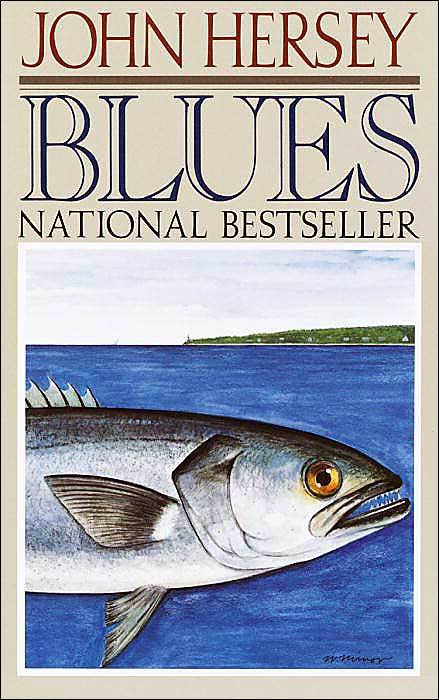If John Hersey, a Pulitzer-prize winning author, can write a book about bluefish, it certainly must be worthy of a mention in a column.
Hersey first came to fame for his stark, vivid portrayal of six people who survived the atomic blast in Hiroshima. In 1946, The New Yorker magazine devoted an entire issue to his article, which detailed the lives of these six survivors. Lore has it that the magazine sold out within hours. It later was published as a book under the name “Hiroshima.”
During his life, Hersey authored more than 20 books. However, it was the one with a bluefish on the cover that reeled me in.
“Blues” was published in 1987. Perfect timing, since long before stripers made their comeback in the late ’90s, Maine was a hot spot for bluefish.
Many of you probably remember what the late 1980s were like if you fished the waters of Casco Bay. It was a time of big hair and big bluefish.
These eating machines prowled the coast from Kittery up past the Kennebec. They were ferocious. They ripped apart bait, chewed up your favorite poppers and thoroughly delighted any angler who was fortunate to find one at the end of his line.
In Brunswick, they chased so much bait up the New Meadows River that the baitfish suffocated in what became oxygen-depleted water. Thousands of fish died, and the relentless summer sun coupled with the rotting fish released a stench that many on the New Meadows remember to this day.
The blues seemed to be filling a void left by nature. Striped bass, once the toast of New England saltwater anglers, had disappeared from the East Coast by the early to mid-1980s. Looking to fill the vacuum in Casco Bay left by a dwindling striper population, bluefish stormed in.
They weren’t unheard of in Maine, but they were unusual. They appeared briefly in the ’70s and then reappeared with a vengeance in the late ’80s.
I remember sultry, windless summer afternoons on Saco Bay, looking for fins dimpling the surface. Or, even better, gulls and terns shrieking and diving, hovering over a feasting school of bluefish, chasing baitfish out of the water and into the air, creating an oily slick before submerging, only to reappear just out of casting distance.
Looking to learn more about these ferocious fish, I picked up Hersey’s “Blues.”
It is a rather cerebral book that was perhaps lost on a young 20-something, for it was written on two levels. Of course, there was the fishing level. It chronicles fishing for blues off the Cape Cod islands in Massachusetts. It’s an intriguing tale of an accomplished fisherman and a land-loving learner. It documents two men fishing together, one teaching, the other learning, in an outdoor classroom.
Nearly every day, the pair fish together, and the old fisherman would bring home but one bluefish to enjoy for dinner. Each chapter contained a recipe on how to enjoy this freshly caught fish.
I enjoyed the novel and marveled at how this author tailored a whole book around the cyclical New England fishing season for blues. It began in late spring, full of energy, and ended with the stark realities of autumn, the end of another year.
I devoured the information about blues, including feeding habits, life cycles, tides, migration, spawning patterns, anything I could that might give me an edge on how to be more successful in catching more bluefish.
Overlooked in a lust to learn more about catching was so much more about fishing. There were lessons about conservation, ecology, responsibility and many other qualities that we strive to possess if we truly want to become dedicated anglers and conservationists.
So upon hearing that anglers had encountered a few bluefish in our area, I went out fishing last weekend. In my corner of Casco Bay, they usually arrive after the Fourth of July. Not in great numbers and not in great size, but with all the fury and frenzy of their much larger brethren.
So as the summer mercury rises and Casco Bay slowly heats up, I will continue to seek out bluefish whenever I hear they are in Maine, for as Hersey so poignantly penned, “I am moved by the fury of the fish.”
For it is that brief moment of fury that will always keep us hooked.
Mark Latti is a former public information officer for the Maine Department of Inland Fisheries and Wildlife and a registered Maine Guide. He can be reached at mlatti@gmail.com
Send questions/comments to the editors.



Success. Please wait for the page to reload. If the page does not reload within 5 seconds, please refresh the page.
Enter your email and password to access comments.
Hi, to comment on stories you must . This profile is in addition to your subscription and website login.
Already have a commenting profile? .
Invalid username/password.
Please check your email to confirm and complete your registration.
Only subscribers are eligible to post comments. Please subscribe or login first for digital access. Here’s why.
Use the form below to reset your password. When you've submitted your account email, we will send an email with a reset code.